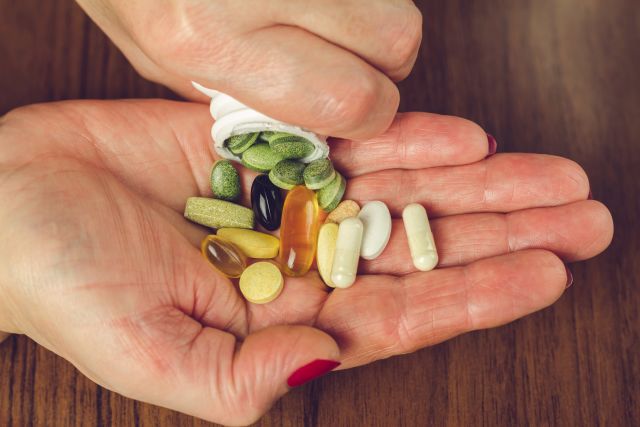Updated on January 10, 2024.
If you have joint pain due to arthritis, chances are you've taken either over-the-counter or prescription pain relievers, namely non-steroidal anti-inflammatory drugs (NSAIDs). But like any drugs, NSAIDs come with the risk of side effects. The potential for stomach ulcers and kidney damage has some people aiming toward other sources of pain relief, like supplements.
But picking a supplement that’s safe and reliable is easier said than done.
Those rows upon rows of supplements at the pharmacy or vitamin shop are enough to overwhelm even the most health-savvy customer. Every bottle claims it can ease your joint pain. But with so many products competing for your attention—and cash—how do you know which is right for you? Are any of them even based on science?
“The thing with supplements is they’re not regulated in the same way over-the-counter medications like ibuprofen are,” says Robyn Hakanson, MD, an orthopedic surgeon at LewisGale Medical Center in Salem, Virginia. The U.S. Food and Drug Administration does not approve dietary supplements, which means the government does not check on their safety and effectiveness as it does with new drugs.
“You never really know if the bottle contains the dose it claims to, and there’s no quality control other than what the company chooses to do,” Dr. Hakanson explains.
The trick is finding supplements that actually take away your pain, not just your money, adds Natalie Azar, MD, a rheumatologist at NYU Langone Orthopedic Center.
There's not a lot of hard science behind most supplements, but many people say they help. With these limitations in mind, here are some popular options and how they stack up against the hype. Talk to your healthcare provider (HCP) before trying any of them.
Glucosamine and chondroitin
Glucosamine and chondroitin are both precursors (or raw material) for a type of protein called the proteoglycans. Proteoglycans, in turn, are building blocks for the cartilage that cushions your joints, explains Azar.
The body manufactures its own glucosamine to help build cartilage, while chondroitin keeps it from breaking down. As people age, they may make less glucosamine. Most glucosamine supplements come from animal sources, such as shrimp, lobster, and crabs. Chondroitin supplements may be synthetic or come from cattle or sharks.
"Supplements claim they can help your body to start building and repairing cartilage on its own, but studies haven't been able to show that," she says.
Study findings haven't been consistent about pain relief, either. Papers called meta-analyses that gather data from multiple studies have come to encouraging, if somewhat variable, conclusions.
One 2018 meta-analysis published in Clinical and Experimental Rheumatology found that the combination of glucosamine and chondroitin eased pain and physical function in the knee and hip, with glucosamine improving stiffness. Another 2018 study of studies that was published in Rheumatology International concluded that glucosamine and chondroitin sulfate (a type of chondroitin) each individually improved knee arthritis pain, but the combination did not. A 2022 meta-analysis in Archives of Orthopaedic and Trauma Surgery found that the combination was useful in overall symptom improvement.
On the other hand, 2019 recommendations from the American College of Rheumatology (ACR) strongly recommend against glucosamine for hand, knee, or hip osteoarthritis (OA), due to concerns that some studies may have been biased by sponsors. Still, the ACR notes that some patients perceive that it works. The ACR also strongly recommends against chondroitin (specifically, chondroitin sulfate) for knee and/or hip OA, as well as combination glucosamine and chondroitin sulfate products. But, the group wrote, “there are controversies in interpretation of the evidence, particularly with regard to the use of glucosamine and chondroitin.”
With such mixed results, glucosamine and chondroitin aren’t usually recommended in clinical settings. But if people take them and feel less pain, HCPs often don’t object, unless they interfere with another prescription or medical condition.
“When people ask, I tell them, ‘I can’t give you studies to prove this will help you, but I don’t know that it will hurt you either,” says Hakanson.
Azar suggests taking both glucosamine (1,500 mg) and chondroitin (1,200 mg) daily. She says they may or may not work, but she also won't argue with the fact that many of her patients feel better taking them, and the supplements do most people no harm.
That said, glucosamine may not be right for people on warfarin, a blood thinner. It could also be a bad choice if you have glaucoma, asthma, or shellfish allergies (since some supplements come from shellfish).
Omega-3 fatty acids
Abundant in fish oil and long touted for their anti-inflammatory properties, omega-3 fatty acids are probably the joint supplement with the most research backing, says Hakanson. Some studies have shown that using omega-3s can help reduce joint pain, stiffness, and tenderness in people with rheumatoid arthritis (RA) and reduce the need for NSAIDs to relieve pain. A 2021 review in Nutrition Reviews examined 70 studies and concluded that giving omega-3s leads to less RA disease activity.
When it comes to fish oil specifically, higher doses (greater than 2 grams per day) may be necessary to reduce inflammation. Even then, pain relief isn’t guaranteed and the risk of side effects could outweigh the benefits.
A higher risk of prostate cancer is a potential downside of taking omega-3s in the form of fish oil, Hakanson adds. Evidence on how fish oil affects prostate cancer risk has been mixed overall, with some studies suggesting it offers protection and others finding it raises risk. This may be related to dose differences, but more studies are needed to understand the relationship between fish oil and prostate cancer.
To avoid potential side effects, such as a fishy taste, loose stools, or nausea, try getting omega-3s from your diet instead of a supplement. Good sources include fatty fish like salmon or mackerel, chia seeds, flax seeds, and walnuts.
Magnesium
A relative newcomer to the pain-relief spotlight is magnesium, a mineral essential to bone and joint health that many people don’t get enough of. Evidence suggests that people who have less magnesium in their diets have worse arthritis.
“It works as a pain reliever and muscle relaxant, and can make you a little sleepy, too,” says Azar. She has prescribed the mineral to fibromyalgia and arthritis patients at 300 mg in the evening, which is less than the daily recommended intake of 400 to 420 mg daily for men and 310 to 320 mg for women. Another perk: magnesium is cheaper than many other supplements.
It’s a wise idea to bypass magnesium oxide (which can soften stool or lead to diarrhea) and opt instead for magnesium glycinate or magnesium citrate. Be aware the potential side effects of taking magnesium include nausea, vomiting, and muscle weakness. At very high levels, heart rhythm abnormalities may occur.
Capsaicin
Capsaicin is what makes chili peppers “hot.” As a supplement, it’s available in a variety of forms, including gels, creams, patches, and pills. When applied to the skin, it may relieve osteoarthritis pain in the underlying joint. It can also help ease nerve pain associated with shingles.
There hasn’t been much strong research on capsaicin, but most of what there is has found it to be more effective than a placebo. The ACR offers a conditional recommendation for capsaicin to treat osteoarthritis, but not in the hand.
Just heed warnings to wash your hands after using capsaicin cream—especially before touching your eyes, mouth, or genital areas. “It can be just as ‘spicy,’ or burn just as much, as putting hot pepper in your eyes,” Hakanson warns.
Curcumin
Curcumin is the active ingredient in turmeric. It’s what gives the spice its yellow color. Some evidence suggests curcumin supplements may relieve joint pain associated with osteoarthritis and rheumatoid arthritis, but more research is needed.
“People have been using turmeric in their food for centuries,” says Hakanson. “I’m not sure I’d take big spoonfuls of it every day but choosing recipes with turmeric is a simple way to get curcumin from your diet, rather than a pill.”
The body tends to inactivate curcumin quickly, but the chemical piperine in black pepper may slow this down and allow curcumin to work better. The next time you make a savory turmeric-based dish, add black pepper; even a small amount can do the trick. Choose a reputable brand, as some imports have been found to be tainted with the bright-yellow toxins lead chromate or lead oxide, and there have been cases of lead poisoning in the United States related to contaminated turmeric.
Before you take any of these supplements, talk to your HCP. They can weigh in on how much and how often you should use them. They can also check to see if the supplement you’re considering will interfere with your other medications or worsen any of your medical conditions.
And whatever supplement you choose, Azar suggests giving it a trial period—such as three months—before incorporating it as a daily habit for the long haul. "If your joints feel better, keep taking it,” she says. “If not, don't bother."







